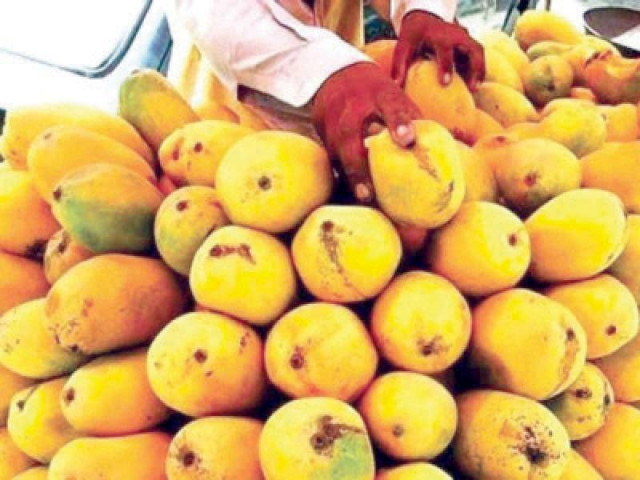Traders slash mango export target
Lament decline in production due to host of reasons including climate change

Pakistani exporters have lowered the mango export target this season mainly owing to a decline in mango output amid a host of other reasons including climate change.
Pakistan is facing 50% to 60% drop in mango production this year due to the effects of climate change and high temperatures.
Besides, shortage of electricity and diesel, increase in cost of packaging/ processing and high freight charges also adversely impacted the mango growers as well as the exporters.
All Pakistan Fruit and Vegetable Exporters Association (PFVA) has lowered its export target by 25,000 tons as compared to the previous year, in view of declining mango production during the season.
The association has set an export target of 125,000 tons for the current mango season. While meeting this new target, Pakistan will fetch $106 million.
Saquib Ejaz Hussain, a senior environmentalist and CEO of EHS Services, said: “Pakistan is one of the worst affected countries by climate change.”
“Due to climate change, major changes have occurred in our weather patterns,” he said, adding that “early arrival of summer and extremely high temperatures have affected the process of fruiting.”
He was of the view that not only mangoes but other crops like cotton and sugarcane would also face a similar impact of the heat wave and water shortage – emanating from climate change and resulting in declining crop production.
He underlined that around 80% of water in the country was being used by the agriculture sector, adding that the farmers rely on the flood irrigation system, “which is ineffective and inefficient”.
“Research and development in the agriculture sector is very much needed to enhance productivity and reduce the cost of doing business, besides managing the environmental and climate change issues.”
According to PFVA Patron-in-Chief Waheed Ahmed, the climate change and high temperatures have severely affected the mango production this season.
“The average production of mango in Pakistan is 1.8 million tons and with 50% reduction, it is likely to be limited to 0.9 million tons,” he noted.
Elaborating, he mentioned that during the current mango season (till mid-March), the average temperature hovered around 37-42 degrees Celsius as compared to 34 degrees recorded in the previous season.
“The sudden rise in temperature has severely damaged mango production, while irrigation problems, water shortage due to blockage of canals, power load-shedding and shortage of diesel during the season have further worsened the situation,” Ahmed lamented.
Expressing serious concern, he underlined that the depreciating rupee, rising labour cost along with high tariff of electricity and gas have multiplied the cost of processing mangoes.
“Packaging material cost has also gone up by 30% since the last season, making it quite difficult for mango exporters to compete in the international market,” he noted.
“Exorbitant increase in sea freight has played a significant role in making competition stiff for Pakistani mangoes,” he added.
Last year, sea freight to Gulf and Dubai was $1,900 per container, but “this year the cost of sea freight has increased to $2,800-3,000”, he said, adding that “it is feared that with simultaneous increase in air freight charges, the transportation cost of mangoes will also be substantially enhanced”.
Published in The Express Tribune, May 19th, 2022.
Like Business on Facebook, follow @TribuneBiz on Twitter to stay informed and join in the conversation.



















COMMENTS
Comments are moderated and generally will be posted if they are on-topic and not abusive.
For more information, please see our Comments FAQ